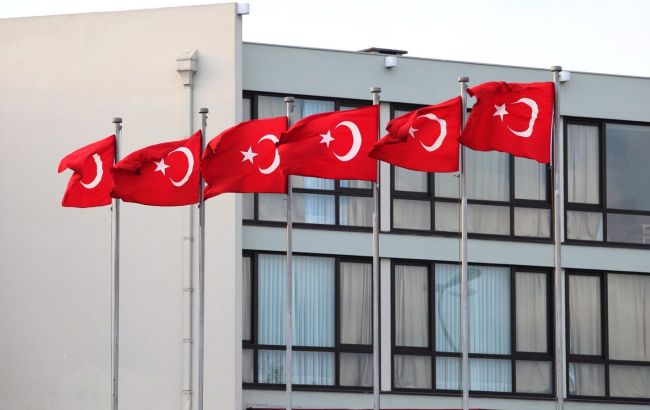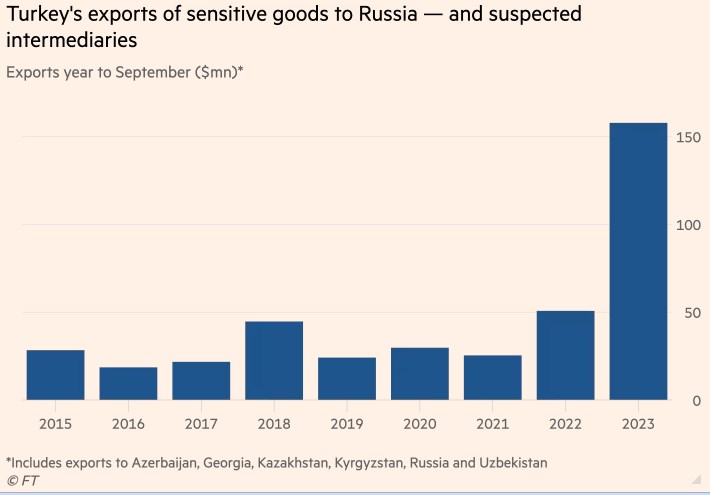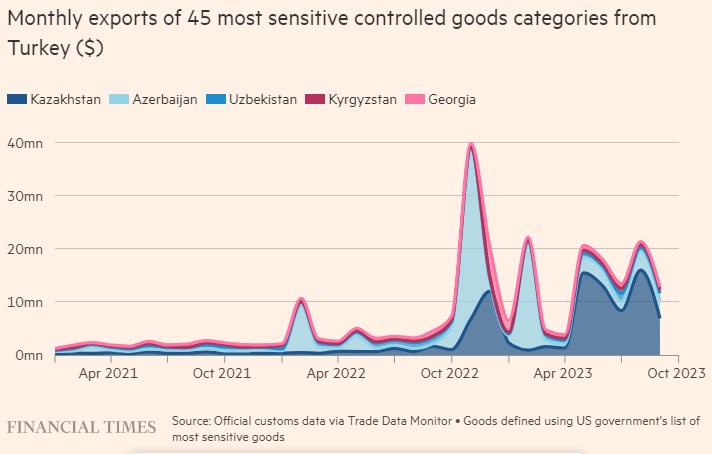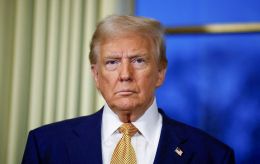Türkiye increases exports of military goods to Russia
 Illustrative photo (Getty Images)
Illustrative photo (Getty Images)
The flow of military goods from Türkiye to Russia has surged this year, hightening concerns in the United States and its allies that the country is acting as a conduit for secret products from its own manufacturers, according to Financial Times.
As noted by the FT, the growing trade, and the corresponding rise in imports to Türkiye of 45 civilian materials used by Russia’s military, has undermined US and European attempts to curb Moscow’s ability to equip its armed forces, fuelling tensions between Ankara and its Nato partners.
In a sign that curbing this trade has become a priority for Washington, Brian Nelson, the U.S. Treasury's Under Secretary for Terrorism and Financial Intelligence, will visit Istanbul and Ankara this week to discuss preventing the undermining of investigations into trade and financial activities that benefit Russia's efforts in its war against Ukraine.
This will be Nelson's second trip to Türkiye this year, and it comes amid signs that some dual-use goods deemed by the US and its allies to be of particular value to the war effort are being shipped directly to Russia, even though they have been labeled as exports to another country.
Attempts to stop this trade with Russia have become more complicated because these goods have both commercial and military uses. In the first nine months of 2023, Türkiye reported exports of 45 goods that the United States considers "high priority" for Russia and five former Soviet countries, worth $158 million. This is three times the level recorded in the same period in 2022, when Russia's war against Ukraine began.

According to the Financial Times analysis of data from the Trade Data Monitor customs database, the average figure for 2015-21 was $28mn, according to a Financial Times analysis of data from customs database Trade Data Monitor. The 45 categories of goods, which include items such as microchips, communications equipment and parts such as telescopic sights, are subject to US, EU, Japanese and UK export controls aimed at preventing them from entering Russia. But these can be circumvented by companies using middlemen structures to disguise their ultimate destinations. Türkiye's imports of high-priority goods from G7 countries are up more than 60 per cent so far this year compared with the same periods between 2015 and 2021 to nearly $500 million.
Center of illicit trade
Türkiye, along with the United Arab Emirates, is often an intermediate destination for Russian companies seeking to use multi-stage import routes to circumvent controls, according to the EU's sanctions enforcement official. In particular, it was used to purchase European goods.
Official data from Türkiye showed an increase in export declarations for priority goods to the former Soviet countries of Azerbaijan, Georgia, Kazakhstan, Kyrgyzstan, and Uzbekistan, but the statistical offices of these countries did not record a corresponding increase in imports.
Analysts say that these large discrepancies suggest that the goods that Türkiye claimed were destined for intermediaries were instead being transported directly to Russia.

Kazakhstan recorded high-priority goods imports from Turkey of $6.1mn in the year to September, but Turkey’s data shows exports of those goods to Kazakhstan amounted to $66mn over the same period.
“It’s obvious these goods are going to Russia,” said Elina Ribakova, a senior fellow at the Peterson Institute for International Economics think-tank and vice-president for foreign policy at the Kyiv School of Economics.
Earlier, the DIU (Defense Intelligence of Ukraine) reported that the two products on which the Russian Federation critically depends the most are Iskander and Kinzhal missiles. In addition, there are foreign components in Russian aviation. At the same time, components from American companies are most often found in Russian military equipment.
The EU Special Representative for Sanctions Implementation, David O'Sullivan, said that Brussels is shifting its attention from adopting new sanctions against Russia to ensuring compliance with existing ones. Third countries will also come into focus.

